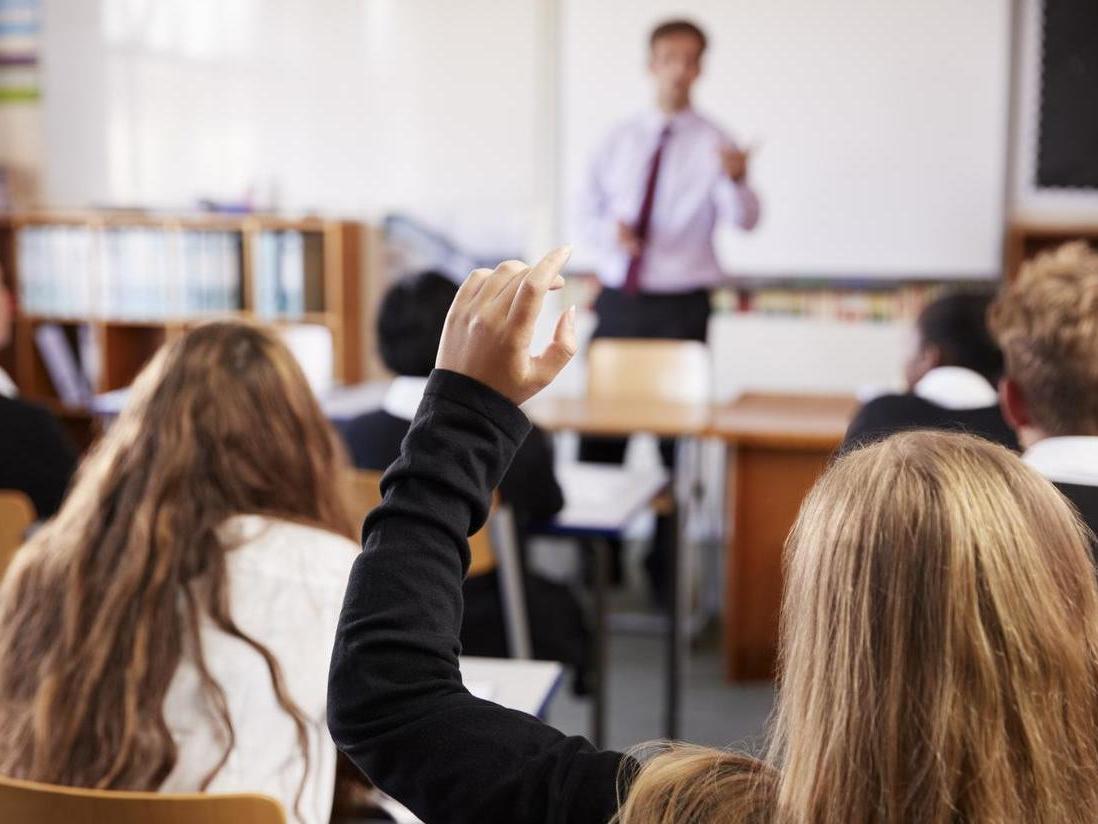School pupils will be less disruptive if teachers greet them individually at classroom door, report suggests
No evidence exists to show impact of zero-tolerance approaches on bad behaviour, study finds

Your support helps us to tell the story
From reproductive rights to climate change to Big Tech, The Independent is on the ground when the story is developing. Whether it's investigating the financials of Elon Musk's pro-Trump PAC or producing our latest documentary, 'The A Word', which shines a light on the American women fighting for reproductive rights, we know how important it is to parse out the facts from the messaging.
At such a critical moment in US history, we need reporters on the ground. Your donation allows us to keep sending journalists to speak to both sides of the story.
The Independent is trusted by Americans across the entire political spectrum. And unlike many other quality news outlets, we choose not to lock Americans out of our reporting and analysis with paywalls. We believe quality journalism should be available to everyone, paid for by those who can afford it.
Your support makes all the difference.Students could become less disruptive in lessons if teachers greeted them individually at the door of a classroom, a report suggests.
A study from the Education Endowment Foundation (EEF) finds a lack of evidence that controversial “zero-tolerance” behaviour policies – where a strict approach to discipline is adopted in schools – have an impact.
Under such policies – which National Education Union members have criticised – pupils will often automatically receive detentions for being late or forgetting homework.
Guidance from the EEF suggests that personalised approaches, like daily report cards, can instead improve disruptive pupils’ behaviour.
There is little evidence today’s pupils behave any worse than previous generations, the report finds.
Sir Kevan Collins, chief executive of the EEF, said: “Despite most pupils in most lessons behaving well, misbehaviour is an issue that has challenged schools for generations.
“It can have a lasting impact on pupils’ learning and teacher wellbeing.”
He added that the report shows how “consistent approaches to behaviour can lead to strong relationships between teachers and students, and form the foundations for learning”.
Schools should use simple approaches as part of a regular routine, such as teachers taking the time to greet each pupil personally at the door of the classroom, to improve behaviour, the report says.
Another suggestion includes offering free, universal breakfast clubs before school starts, which has been found to prepare pupils well for learning, the EEF says.
It came as a new survey from Kellogg’s suggests that one in seven teachers say school funding changes have negatively impacted their breakfast club provision.
The EEF guidance reviewed the best available evidence regarding behaviour in schools, and spoke to teachers, academics and other experts for the guidance.
Geoff Barton, general secretary of the Association of School and College Leaders, said: “We know that establishing a polite and respectful culture in schools is important in setting standards, and the idea of teachers greeting pupils individually at the door of a classroom reflects this approach.”
He added: “Where poor behaviour does occur it is often a product of wider problems being experienced by the pupil concerned, and schools need to be better funded so that they can provide the level of support these young people require.”
Stephen Fraser, deputy CEO of the EEF, said: “Zero-tolerance policies can be controversial due to their strict, no excuses approach.
“Advocates say these approaches help to raise standards, while critics say they may lead to unnecessary exclusions.
“Our report has found that there’s a lack of evidence looking at the impact zero-tolerance policies have on pupil outcomes.”
Paul Whiteman, general secretary of school leaders’ union the National Association of Head Teachers, said there has been a lot said on behaviour in schools that “is neither accurate nor helpful to pupils”.
He acknowledged that good behaviour is important for effective learning, but he added: “For many children and young people, their behaviour is a way of communicating that something isn’t right.
“It is vital that we don’t look at ‘bad’ behaviour in isolation and take too simplistic an approach in tackling it.”
Last month, the Department for Education announced a £10m package for schools needing to improve discipline. The network of schools will be led by government behaviour tsar Tom Bennett.
Nick Gibb, school standards minister, said: “Continuing to improve behaviour in our schools is a key priority for this government.
“Calm and safe school environments benefit all students, allowing them to concentrate fully on their studies. Just one instance of bad behaviour in a classroom can derail an entire lesson, holding back every other pupil in the room.”
The minister added: “We know these instances of classroom disruption damage teachers’ morale and increase workload and stress which is why we want schools to instil a culture of good behaviour.
“This advice from the EEF will be a useful tool for schools to see what works.”
Join our commenting forum
Join thought-provoking conversations, follow other Independent readers and see their replies
Comments